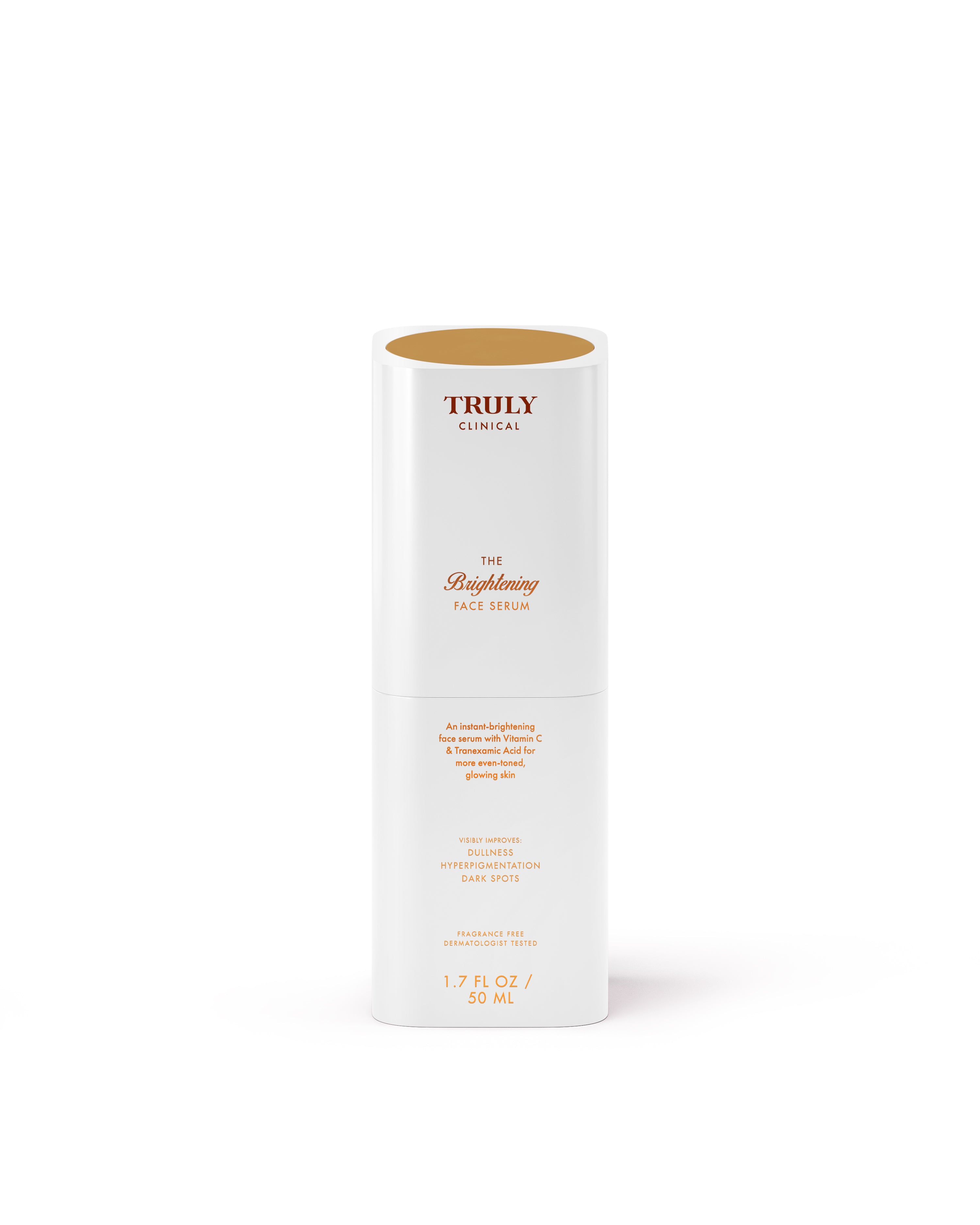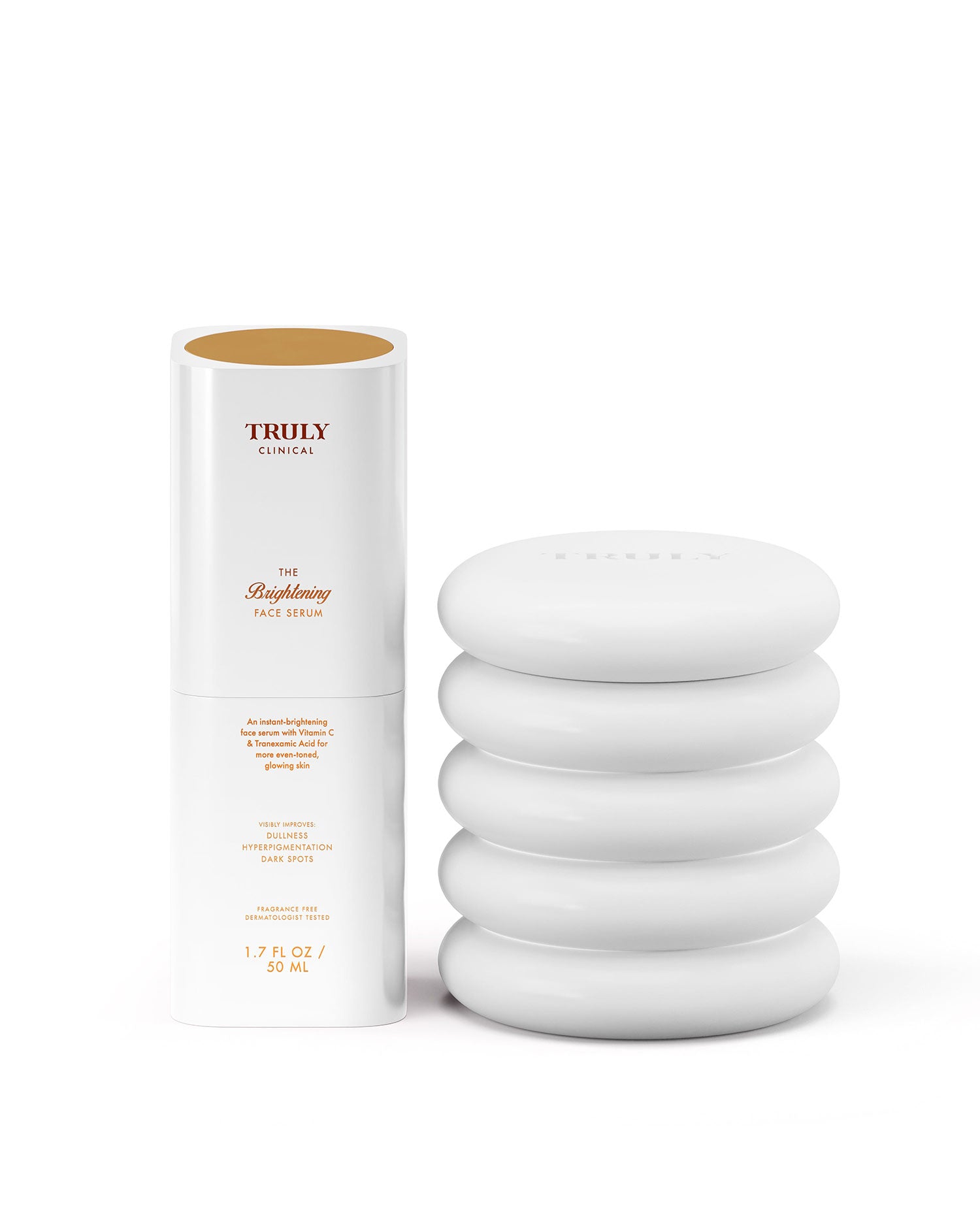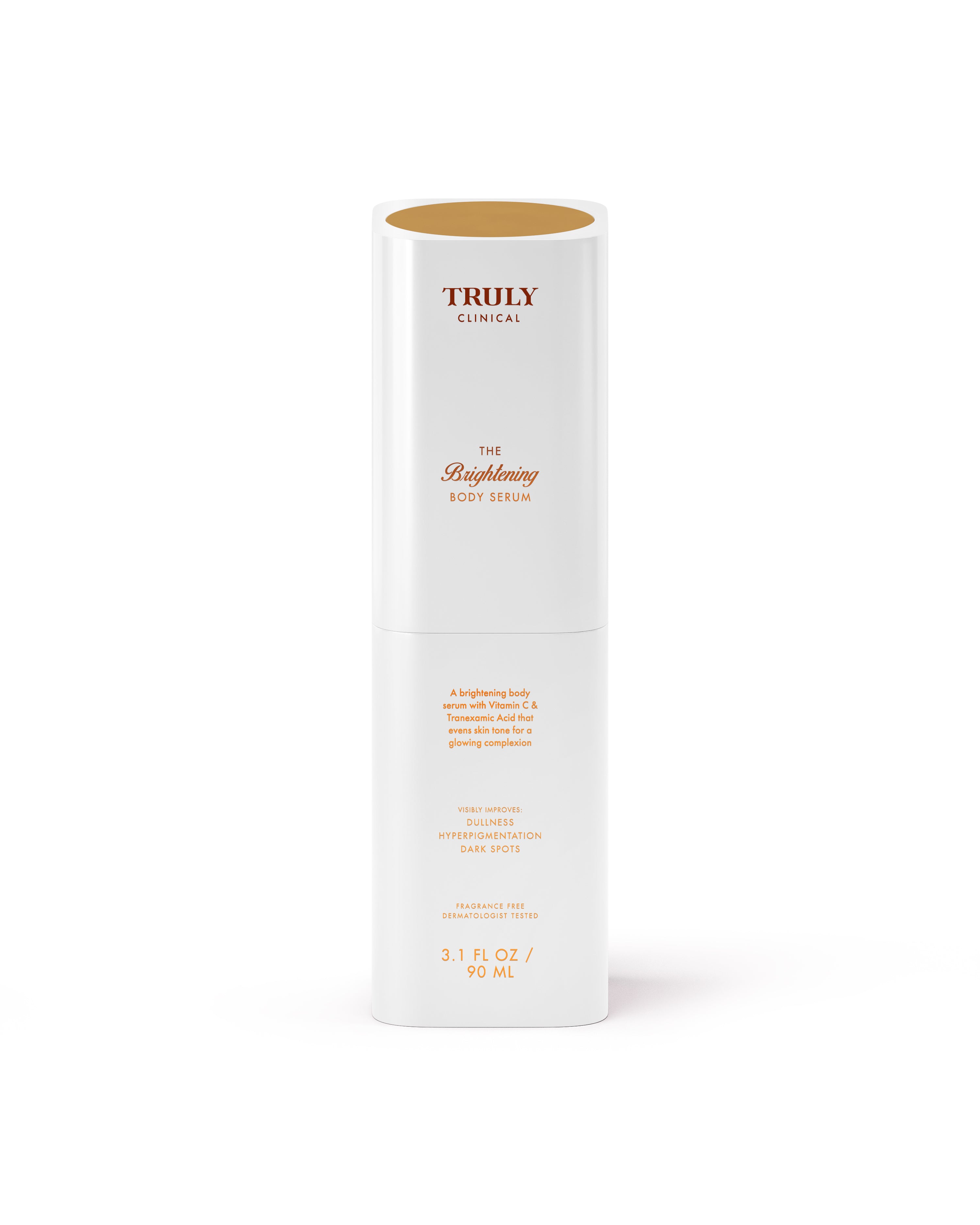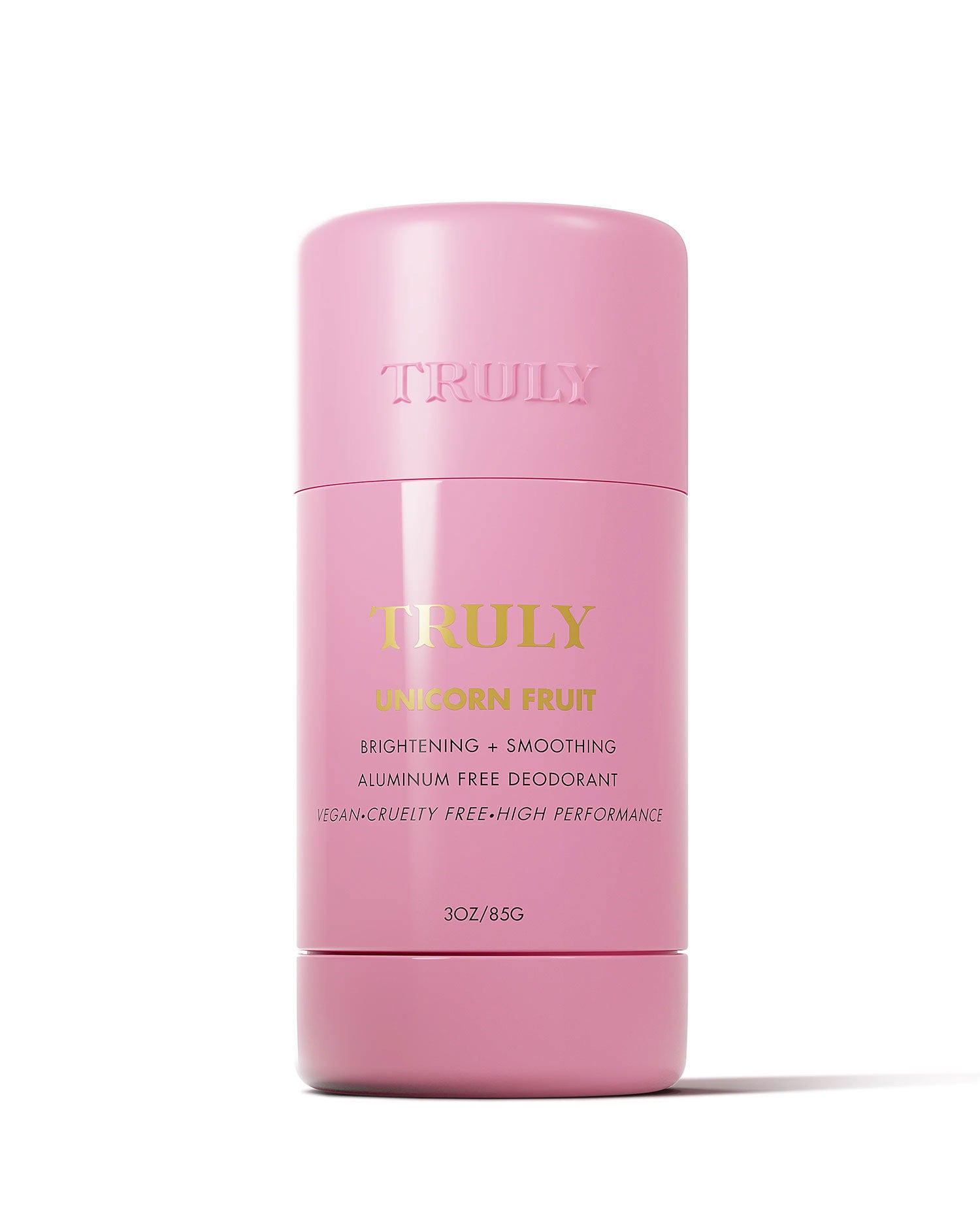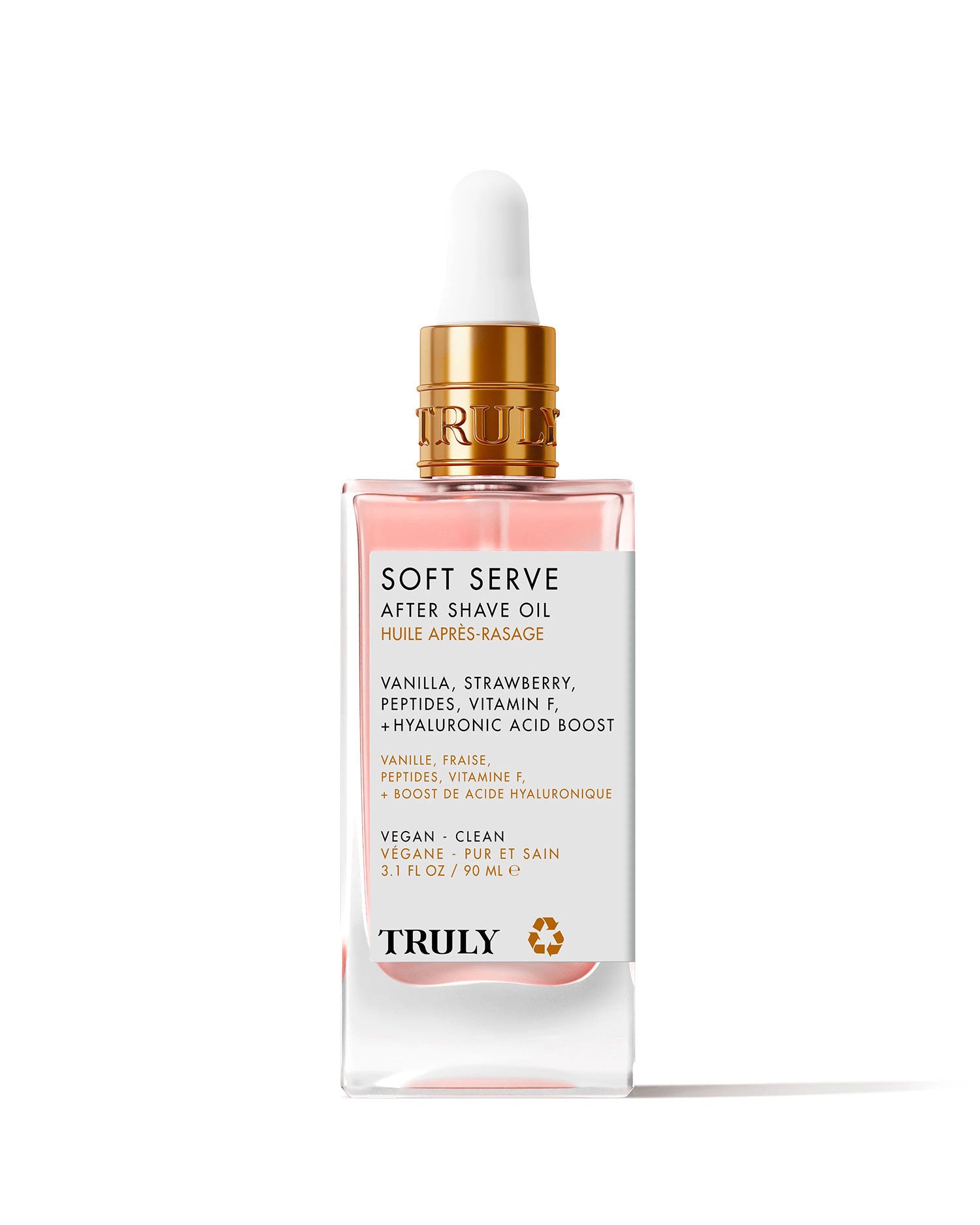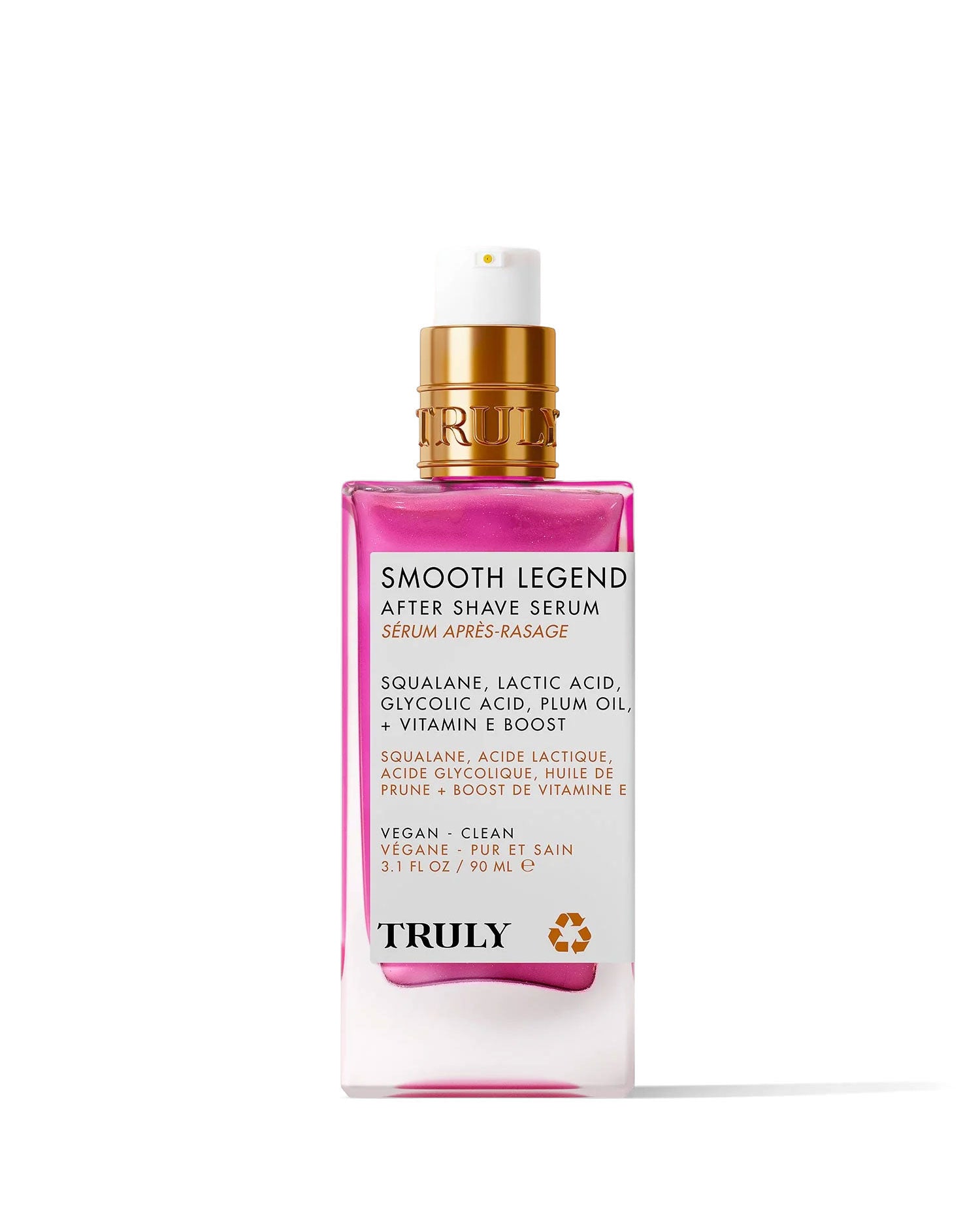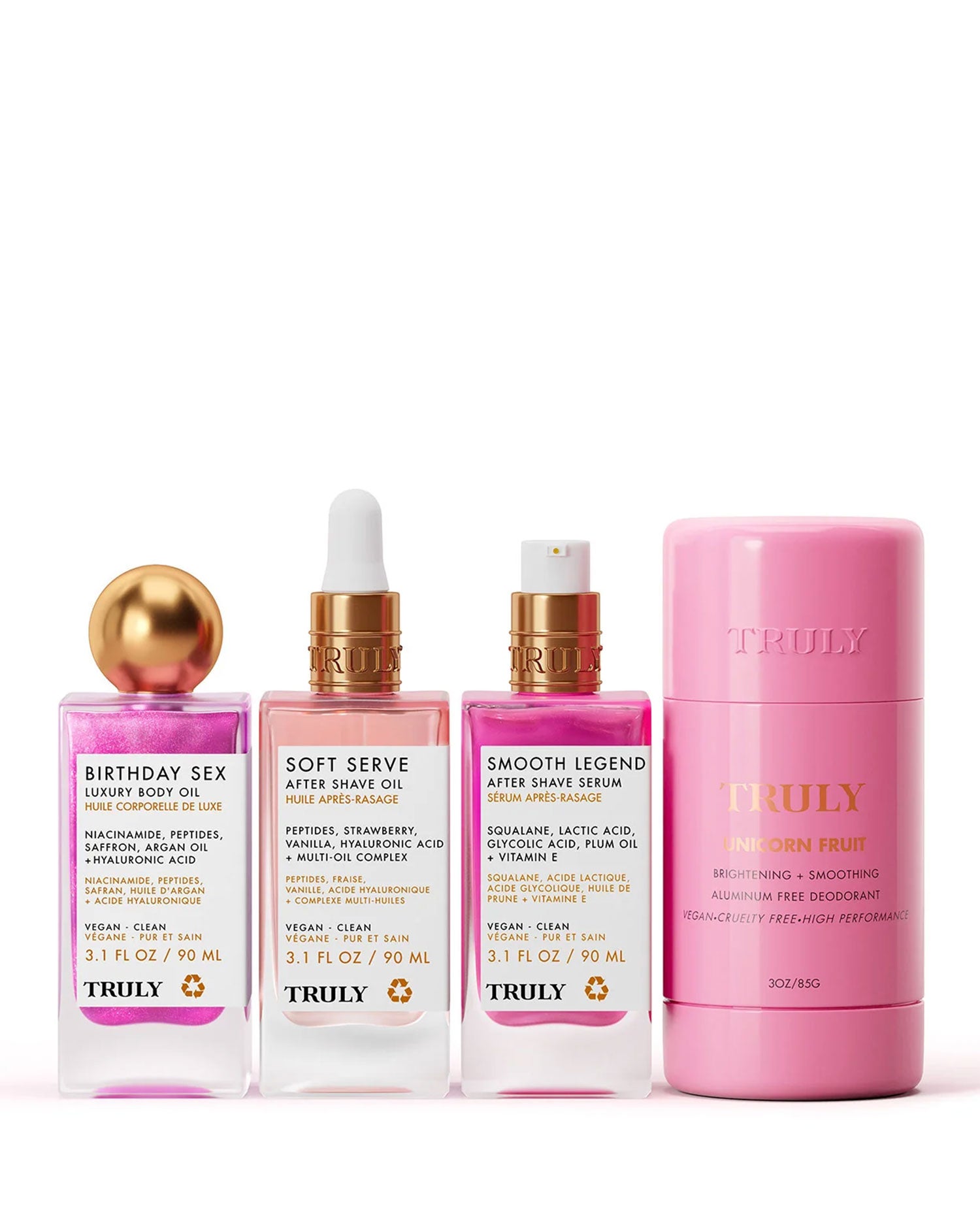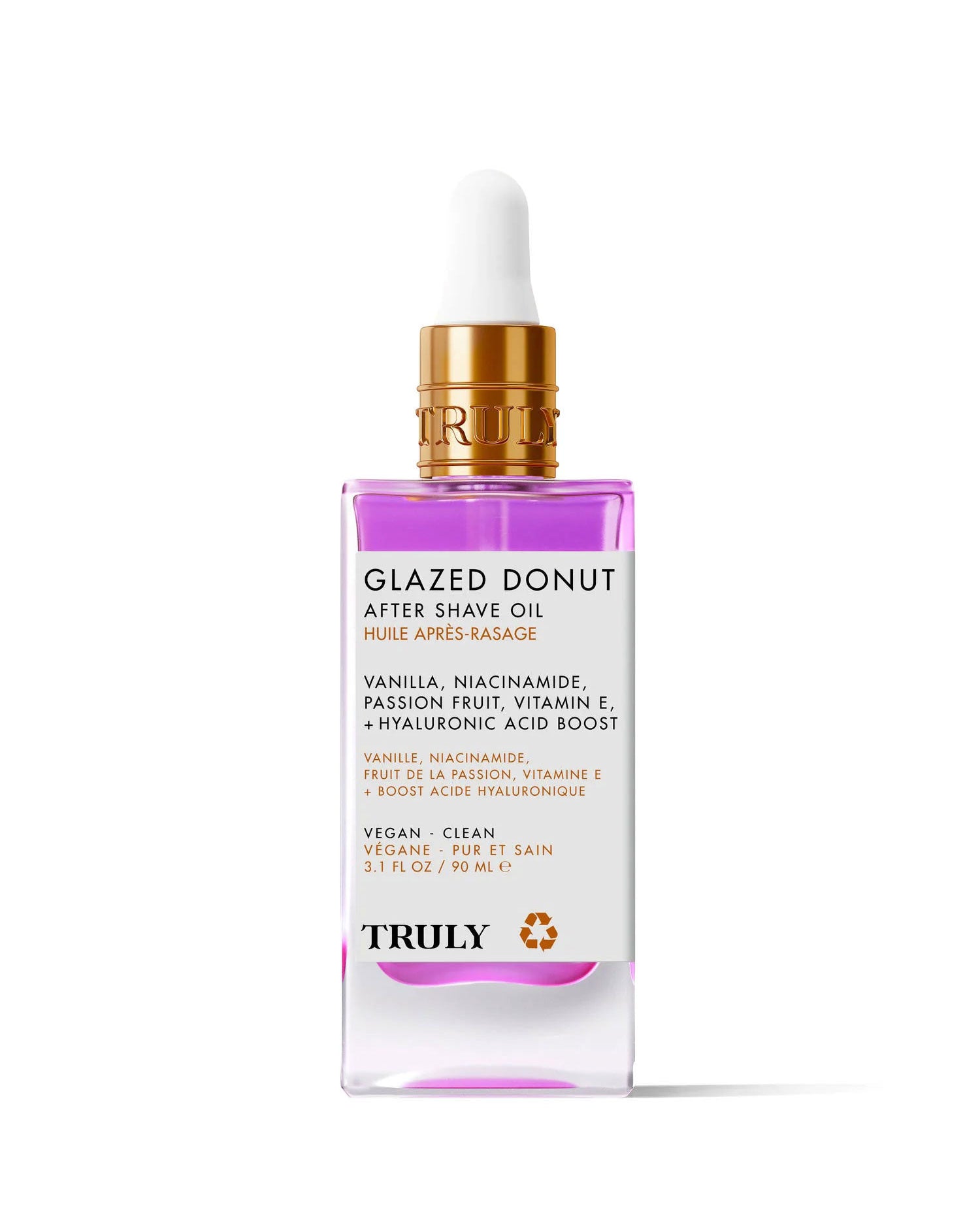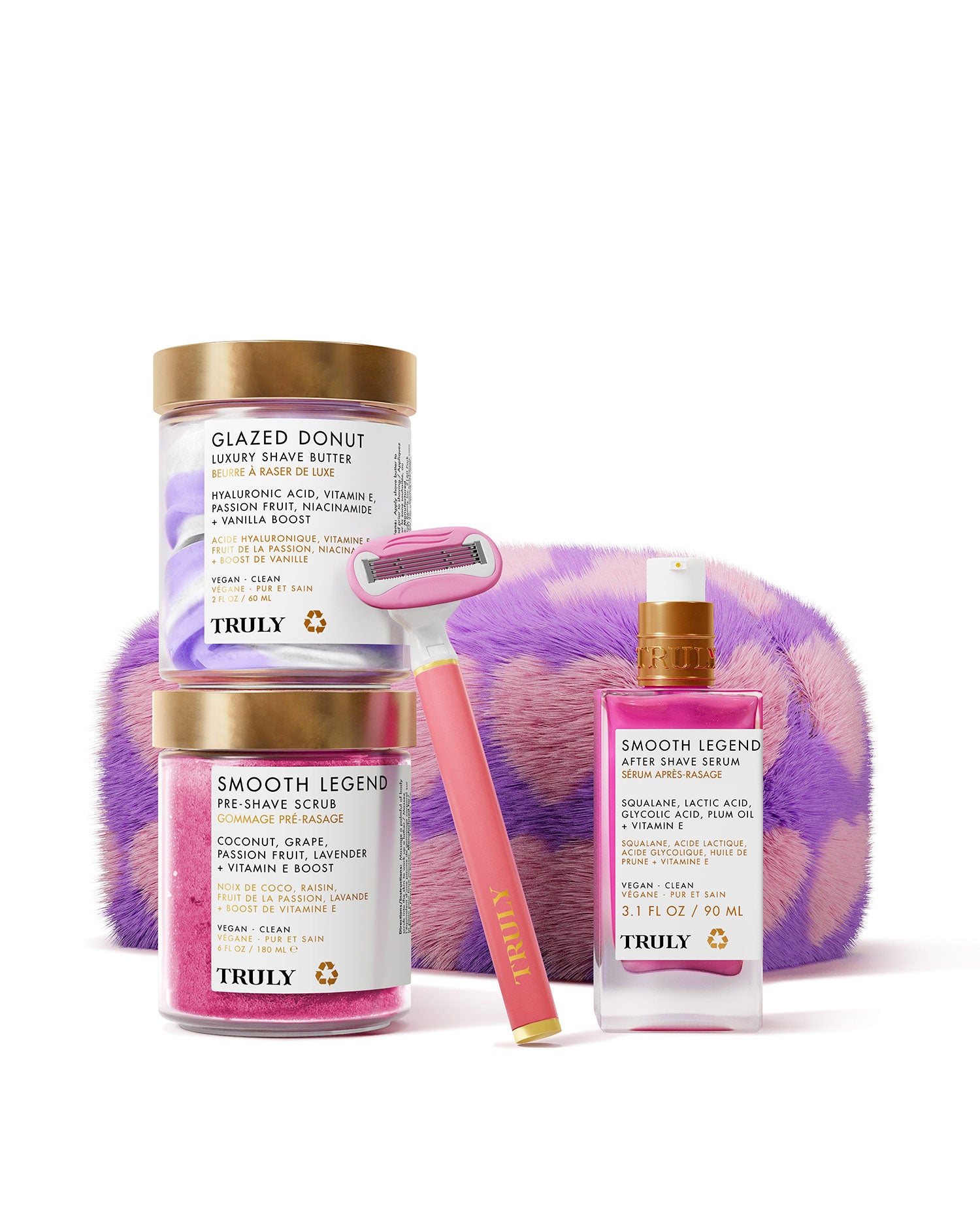What Helps with Hyperpigmentation? Top Dermatologist-Tested Treatments
October 19, 2025
By: Truly Beauty
Discover what helps with hyperpigmentation and diminish dark spots with our top dermatologist-tested treatments.
Ahead, we'll explore what causes hyperpigmentation and how to get rid of it so you can achieve a more even, radiant skin tone. We'll also show you how to prevent hyperpigmentation and discoloration. Read on to learn what hyperpigmentation is, what causes it, and how to treat it.
Fade Hyperpigmentation with Truly's New Brightening Face Serum

Truly's New! The Brightening Face Serum is infused with vitamin C & tranexamic acid to reduce hyperpigmentation, improve skin tone, and visibly brighten skin for a more radiant appearance.
What is Hyperpigmentation?
Hyperpigmentation occurs when patches of skin become darker than the surrounding skin, typically because of excess melanin production. Melanin is the pigment responsible for the colour of your skin. When your body produces more than it needs (or its disposal/turn-over is too slow), dark patches or spots can form.
This skin condition can affect all skin types, but it is often more visible (and more persistent) in medium-to-deep skin tones. It’s triggered by a variety of factors: hormonal changes, inflammation, injury, excess sun exposure, or a combination of these.
Types of Hyperpigmentation

There are a few types of hyperpigmentation. Here are the most common ones.
1: Melasma
Melasma is typically caused by hormonal changes and often develops during pregnancy. With melasma, discoloration most commonly appears on the face and stomach. However, it can appear on any area of the body.
2: Post-Inflammatory Hyperpigmentation
Post-inflammatory hyperpigmentation is a result of inflammation or injury to the skin. Acne, for instance, can often trigger post-inflammatory hyperpigmentation.
3: Sunspots
Otherwise known as liver spots, sunspots are another common type of hyperpigmentation. They are linked to excess sun exposure and typically appear as spots on areas of the skin exposed to the sun, like the face, chest, and hands.
Shop Hyperpigmentation Face Serum
What Causes Hyperpigmentation?
The most common cause of hyperpigmentation is excess melanin production. Melanin is the pigment that gives skin color. When too much melanin is produced, it can lead to darkened patches of skin. Several factors can influence the production of melanin.
Pregnancy alters hormone levels, which can affect melanin production in many women. In fact, hormonal changes in general can increase your risk of developing hyperpigmentation—especially if there’s an increased level of a hormone that results in increased melanin synthesis.
Excessive sun exposure is another common culprit. When you’re exposed to the sun, your body produces more melanin in order to protect the skin, which can cause age spots or sunspots.
Even skin inflammation can cause hyperpigmentation. From acne to eczema or injury to the skin, these can all cause inflammation and ultimately lead to hyperpigmentation on the face and other areas of the body.
Certain medications and health conditions may also be responsible for causing hyperpigmentation. Addison’s disease is a rare endocrine disease that can produce hyperpigmentation on face, neck, hands, and knees.
What Helps With Hyperpigmentation?
Wondering how to treat hyperpigmentation? While hyperpigmentation is a common and often harmless condition, some people may prefer to remove it. Here are some of the best ways to treat hyperpigmentation.
1: Vitamin C
According to dermatologists, vitamin C is one of the best ingredients for hyperpigmentation. One study found that a 10% topical vitamin C formulation had a “strong” effect on pigmentation reduction vs lower concentrations.
Choose Truly's The Brightening Face Serum with vitamin C for an even, radiant complexion and visible brightening from the 1st use.
2: Alpha Hydroxy Acids (AHAs)
Alpha hydroxy acids such as glycolic acid, lactic acid, and mandelic acid all help to treat existing pigmentation while reducing melanin production with consistent use. What’s more, AHAs have exfoliating effects, meaning they can improve the appearance of hyperpigmentation over time while giving skin a smoother look and feel.
By removing dead cells from the skin’s surface, AHAs also allow other skincare products to penetrate more effectively—maximizing their effects. In other words, your topical hyperpigmentation products will work much better on freshly exfoliated skin.
Choose Truly's Cloud Cream Pro-Peptide Facial Moisturizer with lactic acid and glycolic acid to smooth your skin texture and leave you glowing.
3: Niacinamide
Niacinamide, also known as vitamin B3, is a potent ingredient that offers multifaceted benefits in addressing hyperpigmentation. Firstly, niacinamide inhibits the activity of tyrosinase, a key enzyme involved in melanin synthesis.
Additionally, niacinamide plays a crucial role in regulating the transfer of melanosomes, the pigment-containing cellular structures, from melanocytes to surrounding skin cells. Finally, niacinamide possesses anti-inflammatory properties that help calm inflammation and redness.
Choose Truly's The Hydrating Face Serum with niacinamide for plumper, dewier, glowier skin from the very first use.
4: Professional Skin Treatments
What helps with hyperpigmentation if it just isn’t going away with over-the-counter treatments? In this case, you may want to consider in-office treatments. Some of the best cosmetic procedures for hyperpigmentation include chemical peels, laser therapy, and intense pulsed light. Microneedling may also be effective for deeper pigmentation.
We recommend speaking with your dermatologist to discuss your best options. They will be able to advise you on the best treatment for you.

How to Get Rid of Hyperpigmentation From Acne
Acne-related hyperpigmentation occurs when dark spots or discoloration develop after a breakout has healed. What helps with hyperpigmentation from acne? Some of the best topical treatments include vitamin C, retinol, glycolic acid, niacinamide, and mandelic acid. These all help to resurface the skin and promote cellular turnover while reducing inflammation, promoting a clear and even complexion.
If you’re experiencing hyperpigmentation caused by acne, it’s important to stick to an acne-fighting skincare routine to prevent future inflammation and discoloration. Alongside this, be sure to moisturize regularly with a lightweight, non-comedogenic moisturizer. Moisturizing keeps the skin barrier strong, preventing future irritation and inflammation. Plus, it can help the skin to heal more efficiently.
Resist the temptation to pick at or squeeze acne blemishes. Doing so can lead to increased inflammation, potential scarring, and prolonged hyperpigmentation.
Does Hyperpigmentation Go Away?
Hyperpigmentation does go away over time. However, you will need to be consistent with your topical treatments to see a noticeable improvement.
It’s best to follow a daily skincare routine that consists of some of the skincare ingredients mentioned above, such as retinol, vitamin C, and alpha hydroxy acids. If you have sensitive skin, try adding these ingredients slowly into your routine to avoid irritating your skin.
Can hyperpigmentation go away on its own? This all depends on the cause of your hyperpigmentation—and the type. Melasma is the most stubborn type to treat because it’s caused by your hormones. In most cases of hyperpigmentation, however, it is possible that it will fade on its own but it will take much longer without treatment.
How Long Does Hyperpigmentation Take to Fade?
For post-inflammatory hyperpigmentation without treatment, it can take anywhere from several months to two years for dark patches to fade. With treatment, you can expect it to improve within 6-8 weeks. It may take longer depending on the level of discoloration.
How to Prevent Hyperpigmentation
While it is not always possible to avoid hyperpigmentation, you can reduce your chances of getting it by using sunscreen with SPF 30 or higher. You can protect your skin even further from damaging UV rays by wearing hats and clothing that shield the skin from sunlight. Additionally, avoid going out when the sun is at its strongest, which is usually between 10am and 4pm.
Alongside sun protection, avoid picking and prodding at your skin after an injury or where there are blemishes. Picking your skin causes trauma which can lead to post-inflammatory hyperpigmentation. It’s also a good idea to follow a daily skincare routine to keep your skin healthy. It should include a gentle cleanser, vitamin C serum, lightweight moisturizer, and SPF.
Best Routine for Face Hyperpigmentation
To fade dark spots and discoloration on the face, choose Truly's The Brightening Face Routine.
Best Routine for Body Hyperpigmentation
To treat hyperpigmentation on body, choose Truly's top picks for dark spots on the chest, underarms, and everywhere else.
FAQ: What Helps With Hyperpigmentation?
What Helps With Hyperpigmentation the Most?
The most effective ingredients for treating hyperpigmentation are vitamin C, retinol, and niacinamide. These actives help fade dark spots by reducing melanin production, increasing cell turnover, and protecting against UV-induced discoloration. Consistent use of broad-spectrum SPF 30+ is essential to prevent new pigmentation from forming.
Which Serum is Best for Hyperpigmentation?
For professional-level results, try Truly's The Brightening Face Serum for the face and Truly's The Brightening Body Serum for hyperpigmentation on the body.
These two clinical serums contain vitamin C and tranexamic acid to visibly fade dark spots and hyperpigmentation. Plus, they're dermatologist-tested and fragrance-free so they're safe for most skin types.
How Long Does It Take for Hyperpigmentation to Fade?
Results depend on the depth and cause of the pigmentation. Mild post-inflammatory hyperpigmentation can fade in 6-8 weeks, while deeper melasma or sunspots may take up to a year or more. Regular use of brightening serums can significantly speed up visible results.
Can Hyperpigmentation Go Away Completely?
In many cases, hyperpigmentation can fade completely with consistent treatment and sun protection. However, certain types—especially melasma—can be persistent and prone to recurrence. Maintaining a daily skincare routine with antioxidants and sunscreen helps prevent pigment from returning.
What Causes Hyperpigmentation to Get Worse?
Hyperpigmentation often worsens with excess sun exposure, hormonal changes, or inflammation from acne or injury. Not wearing sunscreen or using overly harsh exfoliants can also deepen discoloration. To prevent worsening, wear SPF daily and stick to gentle, barrier-supporting skincare.
How Can I Prevent Hyperpigmentation From Coming Back?
Prevention starts with daily SPF, antioxidants, and gentle exfoliation. Avoid picking pimples or scratching your skin, as trauma triggers excess melanin production. Incorporating vitamin C in the morning and retinol at night helps maintain an even skin tone and prevent new spots.
What Makes Hyperpigmentation Fade Faster?
Combining brightening serums with chemical exfoliants like glycolic or lactic acid helps fade hyperpigmentation faster. These ingredients remove dead cells, improve product absorption, and accelerate skin renewal. For stubborn pigmentation, professional treatments like chemical peels or laser therapy can deliver quicker results.
When Should I See a Dermatologist for Hyperpigmentation?
If your dark spots don’t improve after several months of consistent at-home treatment, it’s time to see a dermatologist. They can assess whether your pigmentation is hormonal, sun-induced, or post-inflammatory and prescribe stronger topicals or in-office treatments for better results.
What helps with hyperpigmentation? Fortunately, there are plenty of options when it comes to treating hyperpigmentation. The most important thing is consistency! That's when you'll see the best results from your hyperpigmentation treatments.
Subscribe to Truly's Brightening Face Serum for a monthly delivery of this dermatologist-tested hyperpigmentation serum and get 10% off every order.
In this article
-
What Helps with Hyperpigmentation? Top Dermatologist-Tested Treatments
-
Fade Hyperpigmentation with Truly's New Brightening Face Serum
-
What is Hyperpigmentation?
-
Types of Hyperpigmentation
-
What Causes Hyperpigmentation?
-
What Helps With Hyperpigmentation?
-
How to Get Rid of Hyperpigmentation From Acne
-
Does Hyperpigmentation Go Away?
-
How Long Does Hyperpigmentation Take to Fade?
-
How to Prevent Hyperpigmentation
-
Best Routine for Face Hyperpigmentation
-
Best Routine for Body Hyperpigmentation
-
FAQ: What Helps With Hyperpigmentation?
-
What Helps With Hyperpigmentation the Most?
-
Which Serum is Best for Hyperpigmentation?
-
How Long Does It Take for Hyperpigmentation to Fade?
-
Can Hyperpigmentation Go Away Completely?
-
What Causes Hyperpigmentation to Get Worse?
-
How Can I Prevent Hyperpigmentation From Coming Back?
-
What Makes Hyperpigmentation Fade Faster?
-
When Should I See a Dermatologist for Hyperpigmentation?
-
What Helps With Hyperpigmentation the Most?







